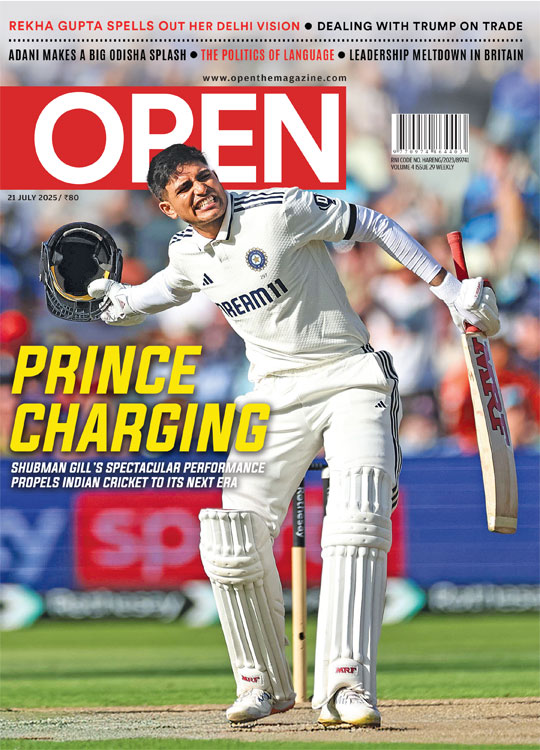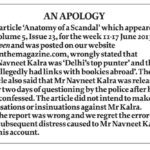Sulk and Be Damned
Never learning from history: Can the disgruntled trio be party poopers of BJP?
/wp-content/uploads/2015/11/bjp-damned.jpg)
Never learning from history: Can the disgruntled trio be party poopers of BJP?
It began with a bang but promises to end in a whimper, even as ticket distribution and alliances for the upcoming Lok Sabha polls get going under Narendra Modi’s baton. Last week, disgruntlement among senior BJP leaders over allocation of parliamentary seats threatened to show up the faultlines within. Sulk Central’s protagonist appeared to be party patriarch LK Advani himself, with others including Leader of the Opposition in the Lok Sabha, Sushma Swaraj, veteran party leader and former president and Union minister Murli Manohar Joshi, besides UP veteran Lalji Tandon, all following suit with murmurs of dissent, prompting sections of the media to dub the BJP a ‘divided house’.
But as swiftly as they rose to a reported crescendo, the voices of discord petered down to a whimper. Such a quiescence should not surprise observers of the party’s internal affairs. Signposts to that effect had been put up months ago by the BJP’s fountainhead, the Rashtriya Swayamsevak Sangh (RSS). Thereby hangs a tale that promises to change the BJP’s electoral face fundamentally, give the party a revised national-political worldview, and make it more responsive to the country’s changing demographics.
Interestingly, a GenNext plan to facilitate the entry of young candidates to the Lok Sabha, even while forcing several party veterans to opt for the Rajya Sabha route to Parliament, was drawn up as far back as a year ago by the RSS. This plan had outlined a path to ease the party’s senior citizens (aged 75-plus years) out of seats in the Lower House and move them gradually to the House of Elders instead. The RSS had conveyed as much to the party’s top brass, including BJP President Rajnath Singh and PM nominee Narendra Modi.
According to party insiders, what was considered a sealed decision had, however, been re-opened by Advani’s insistence that he was keen on contesting Gandhinagar’s Lok Sabha seat yet again in the 2014 polls. The octogenarian leader still heads the NDA, and his public assertion scotched rumours that the party had explicitly suggested that he take the Rajya Sabha route to Parliament.
“The RSS directive was evident when the decision on Rajya Sabha nominees from Gujarat was kept in abeyance this January end,” points out a senior BJP leader, “On 25 January, the party announced its candidates for Madhya Pradesh and Chhattigarh, but did not take any decision on Gujarat. It was kept on hold only to allow Modi to take that call himself. It was only out of sheer respect for Advani that no one pressured him to take the Rajya Sabha route.”
Two days later, Advani said that the issue of his not contesting a Lok Sabha seat was not brought up by anyone in the party: “Nobody has suggested to me that I consider the Rajya Sabha. If they had, I may have considered it. But no one had suggested this to me.” This remark triggered off speculation that Team Modi was keen on shunting out the party’s old guard, of which Advani is a prominent member, as the BJP faces an election in which it hopes to unseat the Congress 10 years after it lost power at the Centre.
To make a point of contrast, insiders offer the example of former Finance Minister Yashwant Sinha, who, despite not being from the RSS ranks, decided unprompted to step aside and let his son Jayant Sinha contest his Hazaribagh seat in Jharkhand.
Like Advani, Joshi is from the RSS ranks, and he too has shown reluctance to quit the Lok Sabha. He has already embarked on electioneering, but signs that he may relent came at a kisan lunch recently, where he said that he was willing to give up his Varanasi seat for Narendra Modi. “I just wanted the party to clarify its position at the earliest,” Joshi told mediapersons.
The controversy that broke out last week, however, came despite the RSS directive on Lok Sabha seats, and had Advani at its centre. The veteran leader is believed to have maintained an uncharacteristic silence at several recent party meetings, especially after his gambit last year to thwart Modi’s early elevation as the BJP’s top candidate went astray. Advani had chosen to stay away from the party’s Goa summit where Rajnath Singh declared that Gujarat’s Chief Minister was the party’s choice for the post of India’s Prime Minister.
The downsizing of Advani’s stature that followed in tandem with Modi’s rise was clear to every watcher of the BJP’s power equations. The change may have been all the more galling for the party’s former PM-in-waiting—a label he could never shake off—once he found he had to await the party’s nod before he could file nomination papers to contest a Lok Sabha seat he has considered his own for a long time.
There was a time that Advani wielded enormous clout within the BJP. He had attained seer stature within the party after his Rath Yatra of the 90s that stirred up saffron sentiments across the country, and his authority—particularly with the party rank and file—went virtually unquestioned for a long time after that. Even though it was Atal Behari Vajpayee who become the party’s first ever Prime Minister, everyone credited Advani with the BJP’s emergence as a challenger to Congress politics. Given this record, his gradual marginalisation in the wake of Modi’s surge to the top is a phenomenon that he perhaps cannot come to terms with easily. “The problem is that Advani and some elders in the party are finding it difficult to accept the paradigm shift in power equations within the party and take the situation gracefully,” says the senior party leader, “It is not a great idea to make disgruntlement and sulking your only identity if you are a senior party leader; that only shows how little your writ runs within the party and how badly you have been relegated to the margins.”
Among the other members of the BJP’s Scowl Secretariat was Sushma Swaraj, who objected to Modi’s elevation at first but later accepted the inevitable. Her detractors point out that Swaraj has not just been in a sulk, she has also been shopping for contrarian issues lately to rake up within the party to reinforce her relevance. Earlier last week, Swaraj, an avid and well-followed tweeter, made clear her opposition to the BJP’s alliance with the Haryana Janhit Party if it were to enroll Vinod Sharma, the Congress leader and former Union minister whose son Manu Sharma was found guilty of murder.
Those in Swaraj’s camp have also tactically conveyed to sections of the media that she had shot off an angry letter to Rajnath Singh expressing dismay at the impending merger of the BSR Congress—of which the mine scam tainted Reddy brothers of Bellary are a part—with the BJP. In her missive, reportedly, she pointed out that allowing ‘tainted’ leaders like B Sreeramulu (two years after he quit the party) and the Reddy brothers into the BJP fold could cost the party its credibility as a serious anti-graft force in the country. The BJP is said to have an eye on the BSR Congress’ voteshare of over 3 per cent in Karnataka, a state it hopes to win a large numbers of seats from. The irony of Swaraj’s protest letter is that she herself was once considered close to the Reddy brothers.
At a meeting held afterwards of senior party leaders to consider election strategy, Swaraj campers maintain, she firmly registered her dismay at the decision to let ‘scam tainted’ leaders into the party and even ‘stormed out’ of the deliberations. One BJP leader, however, offers this succinct summary of that evening’s developments: “She placed her viewpoint on the table and had to leave early to catch a flight; there were no fireworks as is being claimed.” Bellary is a ‘critical seat’ for the BJP in Karnataka, adds the leader. “The party has to marry several viewpoints and take a considered decision on alliances and ticket distribution aimed at maximising our seat count in 2014. That is priority and everyone in the BJP, most of all Sushmaji, who even contested against Sonia Gandhi in that state, is well aware of that.”
What seems to have emboldened a section of the media to paint the BJP as a ‘divided house’ isn’t just the odd twitter-rant and selective leak of information to the media on internal discontent, but also RSS Sarsanghchalak Mohan Bhagwat’s comment that his organisation does not bother much with BJP politics. This professed aloofness of the RSS is not new at all. It is a posture it has maintained for decades (it calls itself a ‘cultural organisation’), and while it plays mentor and holds sway over all outfits that form the larger Sangh Parivar, this allows it to form selective alignments with other political forces too— as a BJP leader contends—as it did in the 1980s by rendering the Congress its support. All considered, says the BJP leader, there is no doubt that Modi is the RSS’s choice and that it rejected outright all objections raised by other leaders, including Advani.
What is heartening for the Modi camp, in spite of what a leader close to the Gujarat CM calls “a few irritants within”, is that apart from the party’s alliances already in place, many leaders from across political parties are showing signs of “warming up” to Modi in the hope of being on the winning side after the hustings.
In Bihar, the BJP has netted Ram Vilas Paswan’s Lok Janshakti Party (LJP), and has successfully wooed important leaders of the ‘Backward’ Keori and Yadav communities. In Andhra Pradesh, the Telugu Desam Party has decided to go for an alliance with the BJP. In Assam, a sizeable chunk of the Ahom Gana Parishad (AGP) has crossed over to the BJP after the RSS expressed its opposition to a tie-up with a spent force such as the AGP. In Haryana, Om Prakash Chautala of the Indian National Lok Dal is keen on a pact with the saffron party. Many other regional parties such as the AIADMK and others may opt for post-poll pacts with the party if it manages to score well in the General Election.
It is in this context that Madhu Kishwar, a feminist Modi-backer, senses a conspiracy on part of a ‘clique of party leaders’ trying to subvert the Gujarat CM’s prospects. She calls this group of saboteurs the ‘160 club’, implying that Modi’s chances of becoming the country’s PM hinge on his party winning at least 180-200 seats in the Lok Sabha. By Kishwar’s analysis, if the party were to score less—say, 160, as she suggests some party members secretly hope—then this would make space for ‘disgruntled’ leaders to stake a claim for the Prime Minister’s post on the strength of their ‘greater abilities’ (than Modi’s) to put together an alliance that commands a majority in Parliament (272 seats).
This is a familiar problem for the BJP, unlike the dynasty-run Congress. Even Vajpayee, they recall, faced it back in 1996 over portfolio allocation during his 13- day stint as PM in 1996—in the form of jabs from the BJP’s lone Muslim face back then, Sikandar Bakht.
Modi himself is not new to such manoeuvres by colleagues: in the aftermath of the Gujarat violence of 2002, questions of his leadership and adherence to raj dharma were put up for open debate instead of being discussed in confidential party forums. But none of this could stop his rise to the party’s top. His camp hopes that his rise to the country’s top will prove just as unstoppable.
About The Author
CURRENT ISSUE
MOst Popular
3

/wp-content/uploads/2025/07/Cover-Shubman-Gill-1.jpg)












More Columns
Trump’s Disruption of World Trade Krishnan Srinivasan
Author Thomas Suárez presents peace framework for the Palestine-Israel crisis Ullekh NP
Shubhanshu Shukla Returns to Earth Open